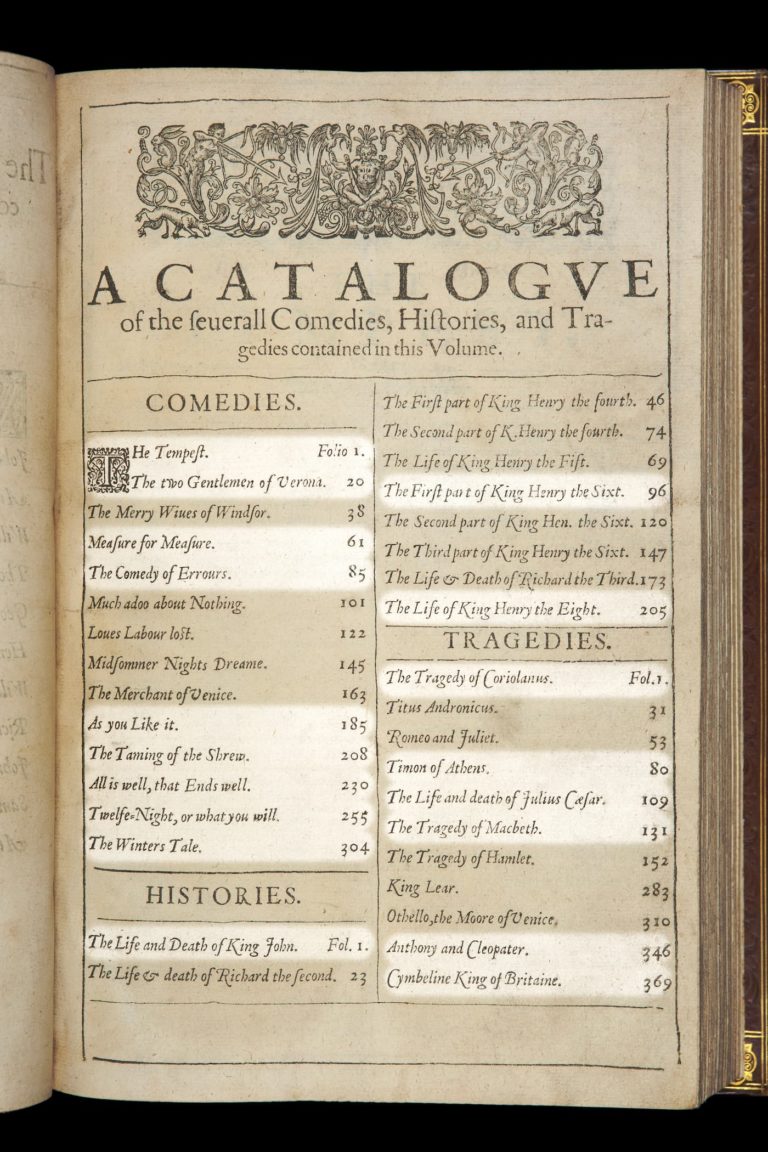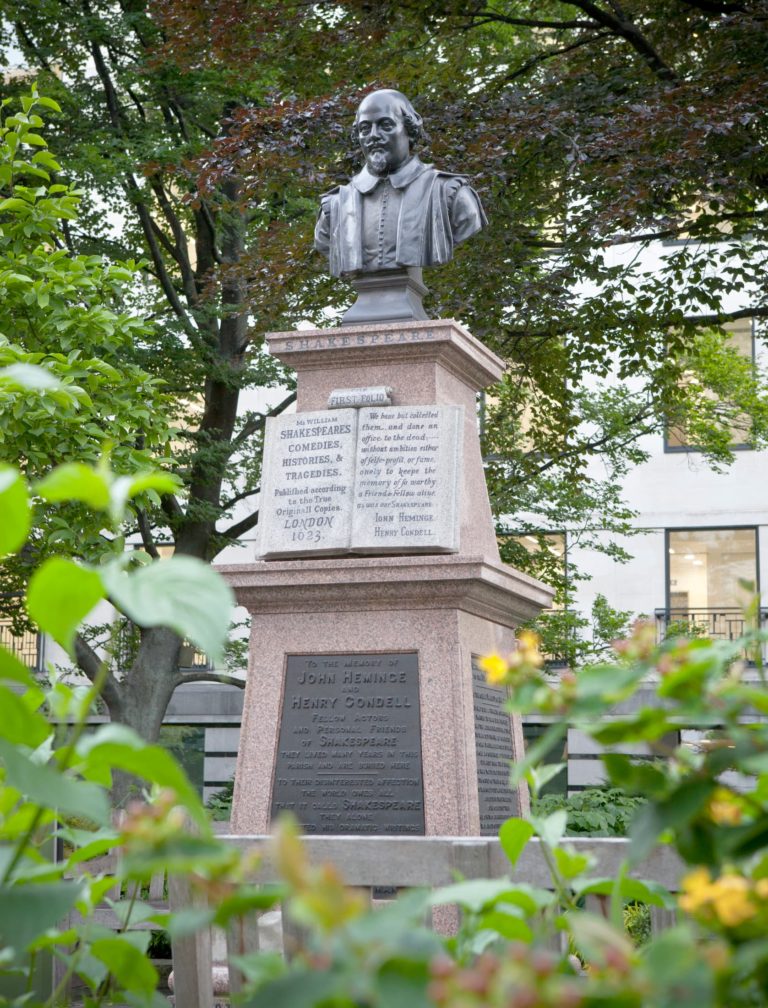Sir Stanley Wells
I don’t remember the first time I saw a copy of the First Folio, but I do remember seeing eighty-two of them all at once. This was at the Folger Shakespeare Library in Washington D. C., where I’d gone to give a series of lectures, later published as Re-Editing Shakespeare for the Modern Reader (1984; currently and unflatteringly ranked by Amazon at 8,153,367 in Books.) There they were, neatly boxed, varying in condition from the almost pristine to the fragmentary, all stacked up in the air-conditioned vaults, pampered and cosseted and closely guarded.
At the Shakespeare Centre in Stratford-upon-Avon, by contrast, we have only three copies of the prized volume. The finest, beautifully bound in red leather with gold tooling, and in excellent condition, is the property of the Royal Shakespeare Company. It had an exciting outing in 1964 when, during the celebrations of the four hundredth anniversary of Shakespeare’s birth, four actors of the Royal Shakespeare Company, including my old friend Tony Church, travelled to Rome to perform a recital for the Pope. The Folio went with them as a prize exhibit and was handed to the Pontiff for his inspection. Mistakenly supposing that it was a gift, he handed it to an acolyte from whom it had to be retrieved with tactful if embarrassed explanations.
I remember too the excitement at a Shakespeare conference in Stratford when Charlton Hinman, inventor of the Hinman Collating Machine and author of the monumental study The Printing and Proof Reading of the First Folio of Shakespeare (1963) – currently on sale on Amazon for £1,523.99 – announced that he was soon to publish at last a reliable facsimile of the book at a price (£25 I think) that would not daunt the average scholar. That would not have been possible had Hinman not been able to collate many of those 82 copies at the Folger. The facsimile appeared in 1968, to great acclaim. A magisterial work of scholarship as well as a beautiful piece of book production, it is made up of photographs of pages selected from many different copies in an attempt to provide a kind of ideal copy. Along with act, scene and line references it uses a system of through line numbering. The Norton Facsimile, as it is known, is now a standard work of reference.
The First Folio came within my ken again when I was asked to serve as External Examiner for a Ph. D. dissertation written by Anthony James West which was later published in two volumes as The Shakespeare First Folio: A New World Census of First Folios (2001). West went on to collaborate with Eric Rasmussen on another monumental work of scholarship, The Shakespeare First Folios: A Descriptive Catalogue (2011), which goes so far as to include an appendix on ‘unfound, untraced, and destroyed copies’. This includes the copy that belonged to the American actor Edwin Forrest which was burned to bits; the remains are reverently preserved in a glass case in Philadelphia.
What of the contents of the book? The First Folio is of course a work of the highest significance to the Western World. Without it we should lack about half of Shakespeare’s plays, including Julius Caesar, As You Like It, Twelfth Night, Measure for Measure, Macbeth, The Winter’s Tale, Antony and Cleopatra, Cymbeline, and The Tempest. As a consequence of course we should lack all the phrases from those plays that have passed into our daily language such as ‘Et tu, Brute’, ‘We are such stuff as dreams are made on’, ‘If music be the food of love…’, and ‘Fear no more the heat o’th’sun.’ We should lack informative and eloquent tributes to Shakespeare by contemporaries, above all Ben Jonson’s great elegy ‘To the Memory of my beloved the author Master William Shakespeare, and what he hath left us’. Without that we should not be calling Shakespeare the ‘sweet swan of Avon’, or saying that he ‘was not of an [which means ‘only one’] age but for all time.’ The history of the world’s stages, of music, opera, film, and ballet, of literature and the visual arts, would be very different. It’s all too much even to contemplate. We owe an incalculable debt to Shakespeare’s fellow actors John Heminge and Henry Condell who put the volume together, and who are suitably commemorated in the statue erected in their memory in Love Lane, in the City of London, where stands also a model of the Folio itself – possibly the only monument ever dedicated to a book – surmounted by a bust of Shakespeare.
And yet …! The compilers of the First Folio did Shakespeare a disservice in two important respects. One is that they divided the plays into the categories of Histories, Comedies, and Tragedies. Shakespeare did not think like this. Some of his plays on historical subjects, such as Richard II, Richard III, and the Roman plays, are formally akin to tragedy, others, such as Parts One and Two of Henry IV, in which Falstaff is a major character, have strongly comic scenes, and Henry V ends like a comedy with wooing and marriage.
My other complaint is that the compilers imposed upon plays written for continuous performance the five-act structure of classical drama, breaking them into acts and scenes and thus falsifying the reader’s experience. As General Editor of the Complete Works in the Oxford edition I was strongly tempted to print the plays with no such divisions. I refrained from doing so only because it would have removed an essential system of reference, but I compromised by asking the typographers to minimize the prominence of the dividers.
2023 will see the 400th anniversary of the publication of the First Folio. Let us place garlands on the marble heads of its compilers, celebrating their gift of one of the most important and influential books ever published.
Sir Stanley Wells
23rd April 2021





